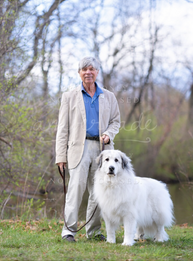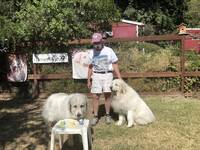
19 Jul Trained Scent Dogs Can Quickly and Accurately Detect Covid-19
MedicalResearch.com Interview with:
Prof. Tommy Dickey Ph.D.
Distinguished Professor Emeritus
Geography Department
University of California Santa Barbara
Santa Barbara, CA
 MedicalResearch.com: What is the background for this study?
MedicalResearch.com: What is the background for this study?
Response: I became interested in dog’s sense of smell several years ago while doing therapy dog demonstrations at the California Science Center in Los Angeles during a special traveling exhibit “Dogs! A Science Tail.” (Now at the Orlando Science Center). I did a lot of research on this topic and taught children about it through the Los Angeles Public Library using my Great Pyrenees therapy dogs. Then, COVID broke out and I expanded my research into any work being done to possibly utilize scent dogs for screening and testing for COVID. I found only a few such studies. However, I fortuitously met Heather Junqueira of BioScent, Inc. (in Florida) online and she was beginning to successfully teach her beagles to detect COVID-related odors. She agreed to co-author a peer-reviewed review paper with me. That led to our first paper –
Dickey, T, Junqueira, H. Toward the use of medical scent dogs for COVID-19 screening. J Osteopath Med 2021;1(2): 141-148. https://doi.org/10.1515/jom-2020-0222
When the COVID pandemic began to wane at the beginning of this year, I felt that it would be the perfect time to do this comprehensive follow-up review to see how far COVID scent dog research had progressed. To our amazement, research efforts had increased by almost tenfold and involved over 400 scientists using over 31,000 samples (including sniffings) from over 30 countries and that 29 peer reviewed papers had been published.
Heather’s inspiration for doing scent dog work came when her father contracted cancer and she wanted to find better diagnostics. She has since been successful in detecting non-small cell lung cancer with her trained beagles as well as COVID.
MedicalResearch.com: Would you tell us a little about the type and/or breeding of the dogs?
Response: In the peer-reviewed studies, the number of different breeds and mixed breeds was 19. Typical training periods dedicated to COVID scent detection were a few weeks. Labrador Retrievers and Belgian Malinois were most commonly used (nearly 100 times). These breeds were chosen because they have been used extensively in scent detection work for several purposes. Other breeds, such as Heather’s beagles, have been used quite successfully as well. No obvious preference based on performance has been noted by breed, age, gender, age or even previous training for scent work. Interestingly, most of the dogs were not specifically bred to do COVID detection. In fact, previously untrained dogs have the advantage that they are not as prone to indicating on scents other than the COVID-19 associated scent. Heather is one of the few scientists who actually breeds her dogs to be single purpose scent dogs (i.e., for COVID or other diseases).
MedicalResearch.com: What are the main findings?
1) Our review has shown that it safe to utilize scent dogs to directly screen and test individuals who may be infected with the COVID-19.
2) The accuracy of the trained scent dog method is comparable to or in some cases superior to the real-time reverse transcription polymerase chain reaction (RT-PCR) test and the antigen (RAG) test.
3) Trained scent dogs can be effectively used to provide quick (seconds to minutes), non-intrusive, and accurate results in public settings and thus reduce the spread of COVID.
MedicalResearch.com: What should readers take away from your report?
- Medical scent dogs deserve their place as a serious diagnostic methodology that could be particularly useful during pandemics, potentially as part of rapid health screenings in public spaces. We are confident that scent dogs will be useful in detecting a wide variety of diseases in the future.
- We feel that the impressive international COVID scent dog research described in our paper, perhaps for the first time, demonstrates that medical scent dogs are ready for mainstream medical applications.
MedicalResearch.com: What recommendations do you have for future research as a results of this study?
1) More studies utilizing more dogs would be beneficial
2) More work in developing target samples is needed
3) More research is needed in different public settings.
MedicalResearch.com: Is there anything else you would like to add? Any disclosures?
- More trained dogs will be needed for wide-spread, large-scale scent dog screening and testing. The training and field use of scent dogs may benefit from the recruitment of dog owners who are already involved in recreational scent work under the auspices of the American Kennel Club and other organizations worldwide.
- Is the use of scent dogs cost effective? Much of the research in this review was in fact motivated by the need for rapid, inexpensive, and lower technological testing in developing nations. More research into the economics is needed.
- Perhaps the greatest challenge to the use of medical scent dogs is the implementation of wide-spread, large-scale programs, which will require funding and development of infrastructure that is responsible for certification, protocol standards, and deployments. This may be more of a challenge in the U.S. for a variety of bureaucratic reasons. Other nations face a variety of obstacles, but the large number of scent dogs already used in practical applications (seen in our paper’s References and Tables) suggests that their governments are quite supportive of the common use of medical scent dogs and may not place as many governmental barriers.
Citation:
Dickey, Tommy and Junqueira, Heather. “COVID-19 scent dog research highlights and synthesis during the pandemic of December 2019−April 2023” Journal of Osteopathic Medicine, 2023. https://doi.org/10.1515/jom-2023-0104
The information on MedicalResearch.com is provided for educational purposes only, and is in no way intended to diagnose, cure, or treat any medical or other condition. Always seek the advice of your physician or other qualified health and ask your doctor any questions you may have regarding a medical condition. In addition to all other limitations and disclaimers in this agreement, service provider and its third party providers disclaim any liability or loss in connection with the content provided on this website.
Last Updated on July 19, 2023 by Marie Benz MD FAAD
